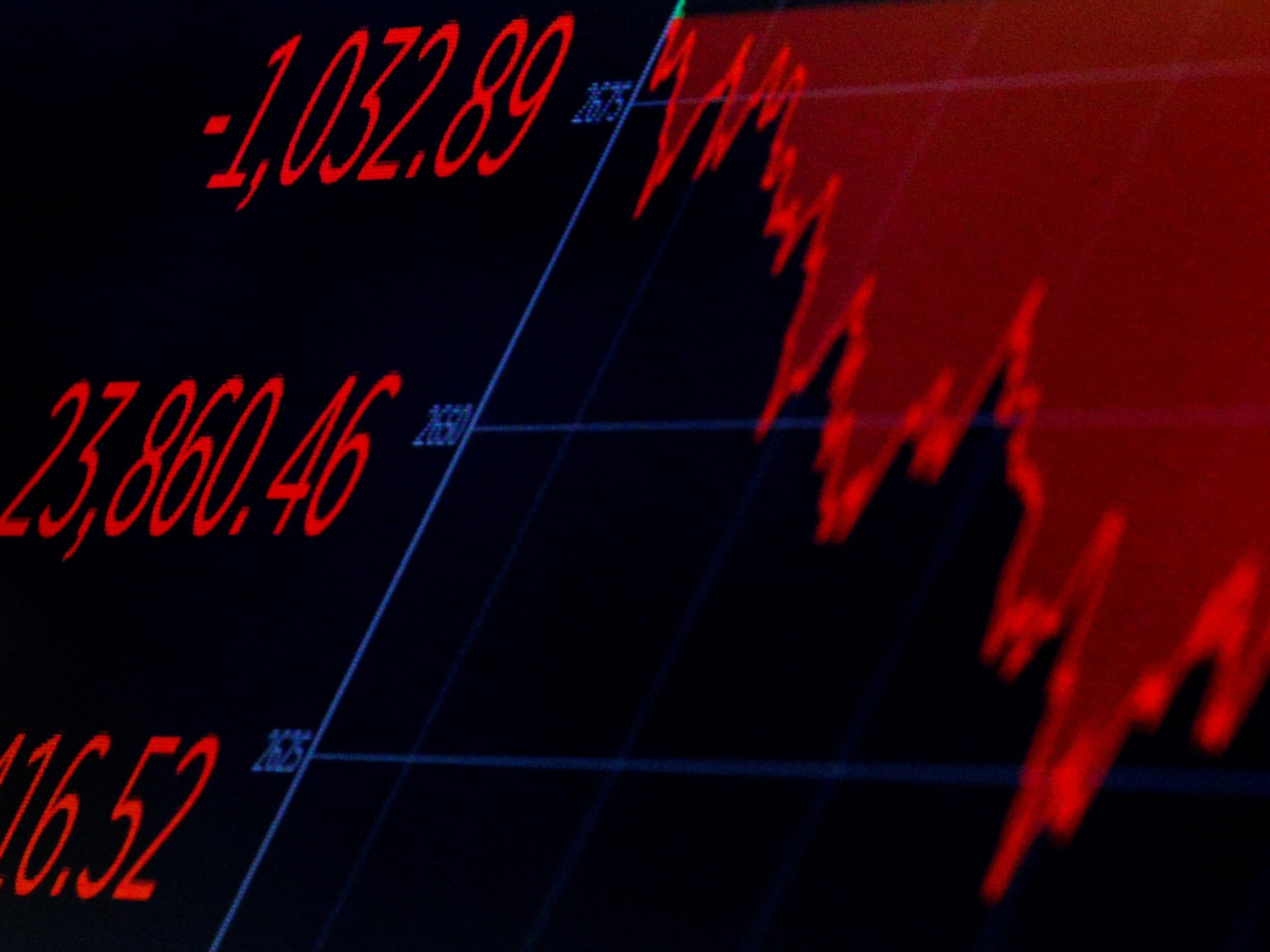Global markets remain volatile as week of drama comes to a close
Dow, S&P 500 and Nasdaq Composite recover some ground after fierce sell-off

Your support helps us to tell the story
This election is still a dead heat, according to most polls. In a fight with such wafer-thin margins, we need reporters on the ground talking to the people Trump and Harris are courting. Your support allows us to keep sending journalists to the story.
The Independent is trusted by 27 million Americans from across the entire political spectrum every month. Unlike many other quality news outlets, we choose not to lock you out of our reporting and analysis with paywalls. But quality journalism must still be paid for.
Help us keep bring these critical stories to light. Your support makes all the difference.
London’s FTSE 100 slipped on Friday after yet another fierce sell-off across US and Asian stocks, fuelled by concerns that global interest rates may rise faster than previously expected.
The UK’s benchmark stock index ended the session down around 1.3 per cent having already suffered a more than 1 per cent fall on Thursday after the Bank of England held interest rates steady at its regular policy meeting but indicated that they may rise again soon.
That sent the pound sharply higher, which in turn weighed on equities. A vast proportion of FTSE 100 revenue is generated outside of the UK, meaning that a strong pound tends to send the index lower.
Elsewhere, China’s main stock index fell by just over 4 per cent on Friday after the US’s Dow Jones Industrial Average declined 4.1 per cent on Thursday and the S&P 500 lost 3.7 per cent. Earlier in the week the Dow was hit by a record 1,175-point loss triggered by better than expected US jobs data that sent US bond yields higher as it introduced the prospect of higher inflation.
On Friday, however, the US indices showed signs of tentatively stabilising.
Here’s a look at how all the action unfolded.
Please allow a moment for our liveblog to load
Good morning and welcome to our coverage of the global markets as the Asian indexes have show a significant decline in response to the 1,000 point drop in the Dow Jones for the second time in a week.
China's Shanghai Composite fell slightly more than 4 per cent, Hong Kong's Hang Seng dropped by 3.10 per cent and Japan's Nikkei 225 index slid by 2.32 per cent overnight. The FTSE 100 will open at 8am and is expected to reflect the mood among spooked investors.
And we're off...
The UK's FTSE 100 index has kicked off trading down 0.45 per cent.
‘Correction territory’
US equities are now down more than 10 per cent from their recent peaks which puts them in what traders call ‘correction’ territory.
Dow Jones Industrial Average declined 4.1 per cent on Thursday and the S&P 500 lost 3.7 per cent.
On Monday the two indices suffered some of their worst declines in years.
Yen's in demand
Japan’s yen is generally considered a safe-haven currency during times of market turmoil and on Friday it closed in on a four-month high against the dollar.
Meanwhile in oil markets…Oil prices have declined for a sixth consecutive day after Iran announced plans to boost production to 700,000 barrels per day and US crude output hit record highs, adding to global oversupply fears.The value of the US dollar has meanwhile risen, which tends to weigh on oil prices.
Copper prices have fallen in London and Shanghai this morning, advancing recent declines in the wake of the renewed dive in global equity markets.On the London Metal Exchange, the mineral is trading below $7,000 a tonne, putting it on course for its biggest week-on-week drop since early December - 3.1 per cent.
Don’t panic
Mark Haefele, of UBS Wealth Management’s global chief investment officer, writes in a note to clients this morning that this next stage of the correction that we appear to be witnessing is also unlikely to derail the bull market we’re still in.
“Amid all of this, the good news is that the fundamental outlook for the economy remains unchanged, and positive,” he writes.
“There has also been little evidence of contagion from equities to other asset classes, or to the real economy. Rates, foreign exchange, and credit markets have all remained relatively calm, in spite of the multiyear high equity volatility.”
In Frankfurt, the DAX is currently trading up 0.2 per cent while France’s CAC 40 exchange is up 0.05 per cent, both clinging on to slim gains.
The fear indexThe VIX Volatility Index, commonly known as “the fear index”, is currently up 5.7 per cent, unsurprising as skittish investors engage in sell-offs as interest rate concerns continue to dominate international markets.
Subscribe to Independent Premium to bookmark this article
Want to bookmark your favourite articles and stories to read or reference later? Start your Independent Premium subscription today.
Join our commenting forum
Join thought-provoking conversations, follow other Independent readers and see their replies
Comments